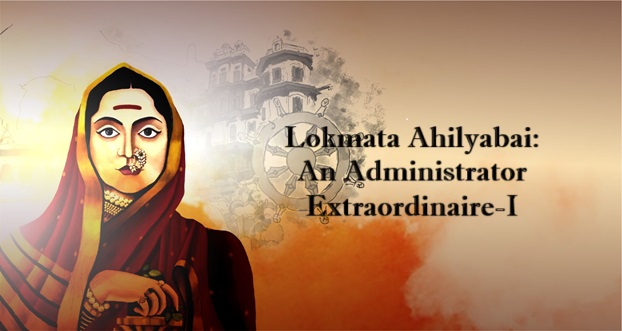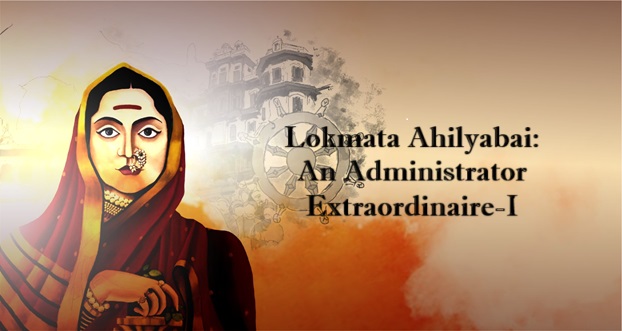

Lokmata Ahilyabai Holkar, the queen of Indore, India, is renowned for her exceptional administrative skills. She ruled during the 18th century in malwa provice, a period of political turmoil and instability in the region. Despite the challenges, Ahilyabai successfully managed to bring unprecedented peace and prosperity to the region. Ahilyabai’s administrative acumen and commitment to the welfare of her people have earned her a place of honor in Indian history. In this two part series, we will examine various measures taken by her as the queen of Malwa. We will begin with examining the structure of her administration.
The way Maratha confederacy was organized, a loyal group of Maratha kings, along with their armies, were always at service of the Peshwa-the emperor and leader of the confederacy. After her succession to the throne, Queen Ahilyabai dedicated Subhedar Tukoji Rao to the service of Peshwa as a representative of Malwa. Subhedar Tukoji Rao’s representations included a standard sized army along with his unwavering loyalty to the court of Peshwa at Pune. This arrangement formed a significant part of Lokmata Ahilyabai’s administration as it ensured healthy diplomatic relations between the Peshwa Madhao Rao-I and herself. Queen Ahilyabai, although subordinate, never stood as a meek bystander and was in fact considered a voice of reason and commanded great respect in the court of Peshwa.
The astute appointment of Subhedar Tukoji Rao in court of Peshwa, strengthened Queen’s position in the confederacy but for peaceful period at Maheshwar, cordial relations with neighboring states were a priority. Therefore, a firm yet generous approach towards other kings and neighboring states were the foundation of her long and peaceful reign.
Saranjami System
Administration of a state requires both military and civil aspects to work well. As already mentioned, Lokmata had ample military support from Peshwa and neighboring states if a need arises. To guarantee a hassle-free civil administration, Lokmata Ahilyabai implemented a reformed Saranjami system she inherited after her coronation. Under her regime Saranjami matured into a well-structured system of “Lords of territory” ruling under her banner on the conditions of having right to govern the land granted to them and to have an army of certain strength at their disposal. Conquest as well as consolidation of these territories and nomination of “Saranjami Sardars” was done by great Subhedar Malhar Rao Holkar (1720-1766 CE) during his lifetime. This system can be understood as a camp within a camp, complete in itself but dependent on the state. These Sardars had their own army, their own seal, were allowed to distribute Jagirs (land holdings) after consultation with the court and were at liberty to freely register their disagreement with the Queen if such a need arises. Therefore, it’s safe to say that Saranjami Sardars enjoyed a status of significance and influence in royal court of Malwa under protection of the Queen. As a part of her kingdom, these Sardars were required to provide royal court a certain amount of tax, mutually agreed upon. The armies raised by these Sardars formed the Huzrat or the “standing army” of the state and were rewarded handsomely for their loyalty and heroics in war.
Queen Ahilyabai commanded support of 18 Sardars who were loyal to her court. These Sardars along with Jagirdars yielded annual income of Rs. 32, 57000 to the court. Apart from providing military and financial contribution, the camp of each Sardar offered protection and provided encouragement to various notable astrologers, Shastris, Pandits, poets, physicians and scholars. She was careful in her treatment of the Sardars. Where on one hand she honored them as per their respective status, she also kept a watchful eye on their administration, swiftly intervening if required. However, most importantly she protected them against any impractical demands put up by the court of Peshwa. In one such incidence, when court of Peshwa issued an order for council of Saranjamis to contribute towards war fund, Queen Ahilyabai responded boldly pointing out the difficulties faced by her Sardars in fulfilling the irrational demand of the second taxation. In her reply to the order, she stated that burdening of already burdened Sardars with a second tax will be a grave injustice as such an act may lead to Sardars feeling pressured as their prestige is threatened. She advised the court of Peshwa to do not disturb the contentment of the Sardars as she renegotiated the terms and secured a much needed remission in the amount suggested by the Peshwa.
Govind Rao Buley, Raje Wagh, Narayanrao Bargal, Yeshwantrao Phanse, Appaji Ram Paliskar, Naro Ganesh, Lambhate were few of the prominent names featured as Saranjami Sardar of Malwa under the reign of Queen Ahilyabai. These Saranjami Sardars along with a few of her council ministers and Subhedar Tukoji Rao formed the backbone of her much revered administration in the region.
Councilors
Apart from enjoying loyalty and support of Saranjimi Sardars, Queen Ahilyabai ruled with the help of a few trusted councilors who looked after various aspects of her administration. Unlike her contemporaries she never had a fully-fledged cabinet in her court which was unusual for her times. Instead, she employed the services of men she had diligently chosen after careful observation and deliberation. These men were not only loyal to her but also displayed a high degree of competencies in managing daily affairs of the kingdom. Among them, Govindpant Ganu holds the foremost position. As a councilor he was in charge of the treasury and Khasgi. Therefore all the charitable institutions, endowments and projects of the Queen were executed under his able supervision. Lokmata Ahilyabai is renowned for building and restoring temples all across the nation. The execution of her orders were personally looked after by Govindpant Ganu. From selection of sites for temples to their architectures and organization of festivals was meticulously planned by him. In the poem “Holkar Prashasti” he is described as an able councilor with in depth knowledge of Shastras, possessor of all good qualities, revered by all. Sir John Malcolm in his book Memoirs of Central India, describes him as a Brahmin of excellent character who remained minister of the Queen throughout her rule of 33 years. Another important figure in her court is that of Shivaji Gopal Gandhe known by the Shivaji Baji. He was a trusted servant of Malhar Rao Holkar and continued to provide his services when Ahilyabai rose to power. Described as a straight, intelligent and fearless person, he served the court at various positions over a period of time but was routinely consulted for his knowledge on matters of finances and diplomacy.
To believe that Lokmata Ahilyabai only employed people of high-born status as her councilors would be wrong as is evident in her appointment of Bharmal Holkar as one of her trusted advisors. Born to a maid servant, he was a personal attendant of the Queen before her ascension to the throne. He was sent by the Queen to quell internal disturbances and riots among the subjects. Also, he successfully resolved several important disputes of villages preventing situations of riots and unrest. Trusted by the Queen, he looked after her children and grandchildren. His records of daily routine of Lokmata’s life became an invaluable source of rich history of Malwa. Among the councilors it’s imperative to mention the contributions of Vishvajee Shamraj Deshpande. A councilor of sharp diplomatic aptitude, Vishvajee played a significant role in securing favors from Peshwa for the Queen while helping to maintain cordial relations with other kings including Mahadji Scindia.
Ambadass Puranik stands as a unique figure among all the important names as he was not appointed at any formal position in the court but was revered by her as Guru. Each morning he would recite Puranas to the Queen and explain their deeper meaning to her. Lokmata would often seek his wisdom and advice on various matters, therefore honoring a long standing tradition of Bharat where a monarch is guided by the Guru in matters of administration, justice, religion and humanity.
As is clear by now, Queen Ahilyabai had put a strong network of trustworthy councilors and Saranjami Sardars in place to bring peace and prosperity to Malwa. In next part we will see, the various changes bought on the ground, a true testament to her abilities as a ruler.
Author is an Assitant Professor of Zoology at Bhaskaracharya College of Applied Sciences, University of Delhi. He is attached with Lokmata Ahilyabai Holkar Adhyayan Kendra, New Delhi.
For deeper insight into life Lokmata Ahilyabai Holkar, visit https://lokmataahilyabai.com



Excellent article transported me to my childhood memories in streets and roads of Indore, my Indore.